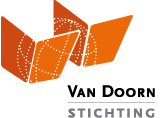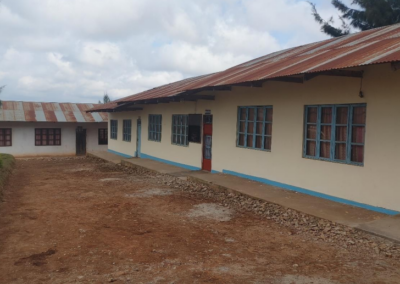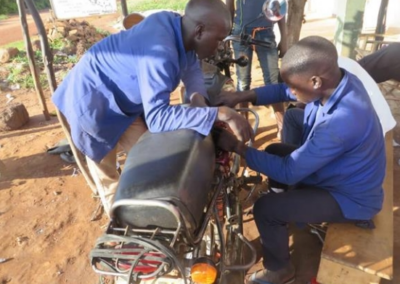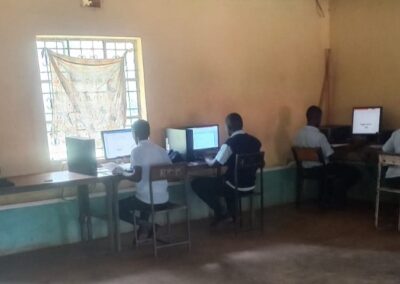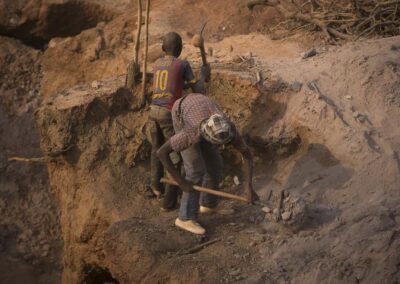Training material and tools are essential to provide quality vocational education. Moreover, the Van Merode College must develop the training modules (the curriculum) of the school to obtain certification by the Ministry of Education.
The Van Doorn Foundation has made funds available for the purchase of the required material, has assisted the school in developing a business plan for the training centre and – based on this plan – with in developing the training modules and the training of trainers.
Project has been executed successfully!
Amount donated: € 4,200.-
Sponsor: Kringloopwinkel Woudenberg and employment agency Unique
Project information
The situation
Kasese District is located along the equator at the border with the Democratic Republic of Congo. Kasese town originally developed around the Kilembe copper mine and then the cobalt and cement mining, but Kasese is now better known for the national parks like: The Queen Elizabeth National Park, Rwenzori National Park, Crater lakes, the hot springs, amazing fauna and flora, friendly people with a great culture that offer countless opportunities for excursions and safaris, including bird watching and chimpanzee tours. Rwenzori Mountains National Park is a UNESCO World Heritage Site with the top 3 highest peaks in Africa, many waterfalls, lakes, glaciers and hot springs.
Bwera is the border town between Uganda and the Democratic Republic of Congo. Just like the more southerly situated districts of Kanungu and Kisoro, was also the Kasese district (Bwera) confronted with a large influx of Congolese refugees in recent years fleeing violence in the Democratic Republic of Congo. Among them, many of their parents separated, unaccompanied minors, children and elderly with disabilities and victims of sexual and gender-related violence. Since children formed the majority of the refugees, safe shelter and temporary schools had to be built with adequate sanitation.
It is in this vulnerable and sometimes hostile environment that Van Merode College, a community-based training institute, was set up with the aim of enabling unemployed young people and early school leavers to take appropriate vocational training.
The importance of the project
The Van Merode College is located in the border city Bwera where the population lives in absolute poverty, where the HIV infection rates are high, unemployment among young people high and where many child marriages and teenage pregnancies take place. Van Merode College is confident that young people with a proper vocational training will enable them to get work, generate income, meet basic needs and improve their standard of living.
The implementing organisation
The Van Merode College was founded in 2015 and formally registered in 2016 and has as its official goal: ’empowerment of jobless and poor rural youth with vocational skills for a better life’. The umbrella organization (Ecumenical Orthodox Catholic Church) started in 2013 with setting up a kindergarten, an elementary school, a mother-child health centre, and in 2015 with the provision of training in crafts (carpentry, car mechanics, hairdressing, tailoring and making and recording music). The school has minimal training resources (a sewing machine, an old car, two mannequins and a few saws) and now trains some 60 young people in various crafts over a period of at least 6 months (practice only) to a maximum of 24 months (including theory for state exam).
With course fees between € 30 and € 90, the annual income is € 3500, allows to pay for the running costs of the centre (it works a lot with volunteers).
The envisaged project results
Van Merode College currently runs the lessons in a rented building and, at a given moment, wants to build its own classrooms and practical training workshops. To provide qualitatively adequate vocational education, tools are needed for automotive mechanics and carpenter training, hairdressing equipment, spare-parts and repair of a driving lesson car, training equipment for music production, sewing machines with supplies and student overalls for practical lessons. Our treasurer visited the Van Merode College in June 2018 and found that the resources now available are too minimal to provide quality vocational education. The requested training materials and tools are therefore certainly not a luxury. Moreover, the Van Merode College must develop the training modules (the curriculum) of the school to obtain certification by the Ministry of Education.
The chance of sustainability
The Van Doorn Foundation is happy to support this project! In addition to providing funds for the purchase of the necessary training equipment, the Foundation also assisted Van Merode College with the development of a school (business) plan and – based on this plan – with the development of the training modules and the training of trainers.
By working with part-time trainers (who also have other work / income) and with volunteers, the Van Merode College can keep running costs low, which that can pay from the (low) course fee. Sustainability and financial independence are thus (more or less) guaranteed. Selling products made by the students then creates a potential for additional income.
With the resources made available, the project is expected, over a 2-year period, to train more than 150 unemployed and poor rural youngsters can be trained in skills that give them the chance of decent jobs. The project will bring about a process of empowerment and self-confidence that will benefit everyone in the local community. The project will strengthen human capacity to address the many challenges society is facing today. The project will reduce absolute poverty as the young graduates get work. This allows them to generate an income for themselves, improve the income of their households and meet their basic needs and possibly create jobs for others.
The progress of the project
In 2018, Van Merode College, with support of the Van Doorn Foundation, developed a school business plan for the center and curricula for the various courses. This is to ensure that the objectives can be achieved. The plan pays attention to the efficient operation of the center, the achievement of sustainability, the assurance of the quality of the programs and the recognition by the government.
Subsequently, at the end of 2018 funds (€ 2600) were made available for the purchase of tools and teaching materials for the training of car mechanic, carpenter, tailor and hairdresser. Early 2019 € 800 was made available for the development of training modules, the purchase of training manuals and teaching materials and another € 800 for the salaries and training of teachers during the start-up period.
The result
The Van Doorn Foundation had provided funds (€ 2,600) from its own resources for the purchase of training material and tools. The Kringloopwinkel Woudenberg, the Employment Agency Unique and a number of private individuals made funds available (€ 1600 in total) for the purchase of a laptop and printer and to make training modules and the training the trainers.
The project was successfully completed in mid-2019. Van Merode College has in the meantime, with the support of other sponsors, been able to set up its own school building, which has eliminated the relatively high cost of ‘rent’ and increased the sustainability of the center.
For these projects your support is necessary!
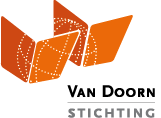
Bedankt!
Bedankt dat je wilt bijdragen aan dit project! Vul hieronder het formulier in en je wordt naar een iDeal pagina gebracht om de betaling te kunnen doen.
